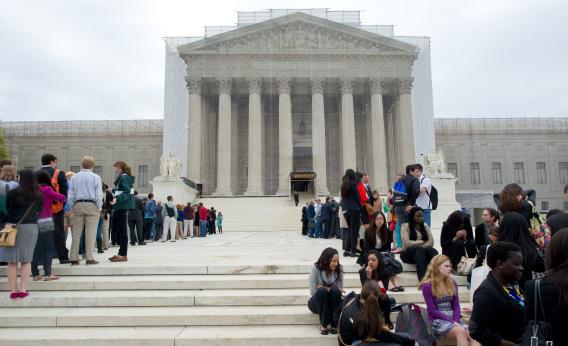Today was decision day at the Supreme Court, where the justices handed down several decisions this morning but kept everyone waiting for news on the big three cases (affirmative action, voting rights, and gay marriage). Still, the day wasn’t without a noteworthy decision: Arizona v. The Inter Tribal Council of Arizona, Inc. struck down the state’s law requiring proof of citizenship from people seeking to register to vote in federal elections. Here’s NBC News with the instant analysis:
The vote was 7-2, with Justice Antonin Scalia writing for the court. Justices Clarence Thomas and Samuel Alito, two members of the court’s conservative wing, dissented.
Several states said that such a law reduces voter fraud, but civil rights groups said it was an effort to discourage voting by legal immigrants. The case was argued and decided at a time when the country is considering how to change its immigration laws. … Three other states — Alabama, Georgia and Kansas — have almost identical laws and joined Arizona in urging the court to uphold the additional requirements for proof of citizenship.
The measure, which became law in 2004 by way of a ballot initiative, required would-be voters to prove that they were citizens by submitting copies of (or information concerning) various documents, including a birth certificate, passport, naturalization papers or a state driver’s license. As the New York Times explained back in March, the question facing the court was whether that law conflicted with the National Voter Registration Act of 1993, which allows voters to register using a federal form that asks simply, “Are you a citizen of the United States?” A prospective voter then checks a box marked “yes” or “no,” and signs the form swearing he or she is a citizen under penalty of perjury.
Slate’s Emily Bazelon will have more on the case and what it means a little later today. Meanwhile, the wait continues on the Big 3. Thursday and next Monday are the next two decision days currently on the court’s calendar.
